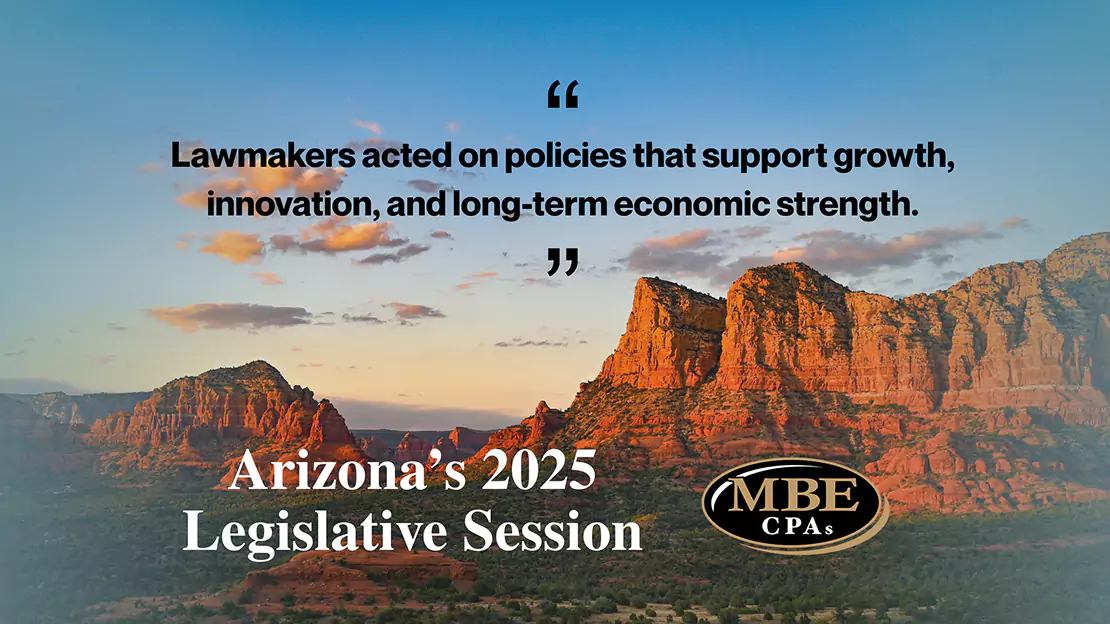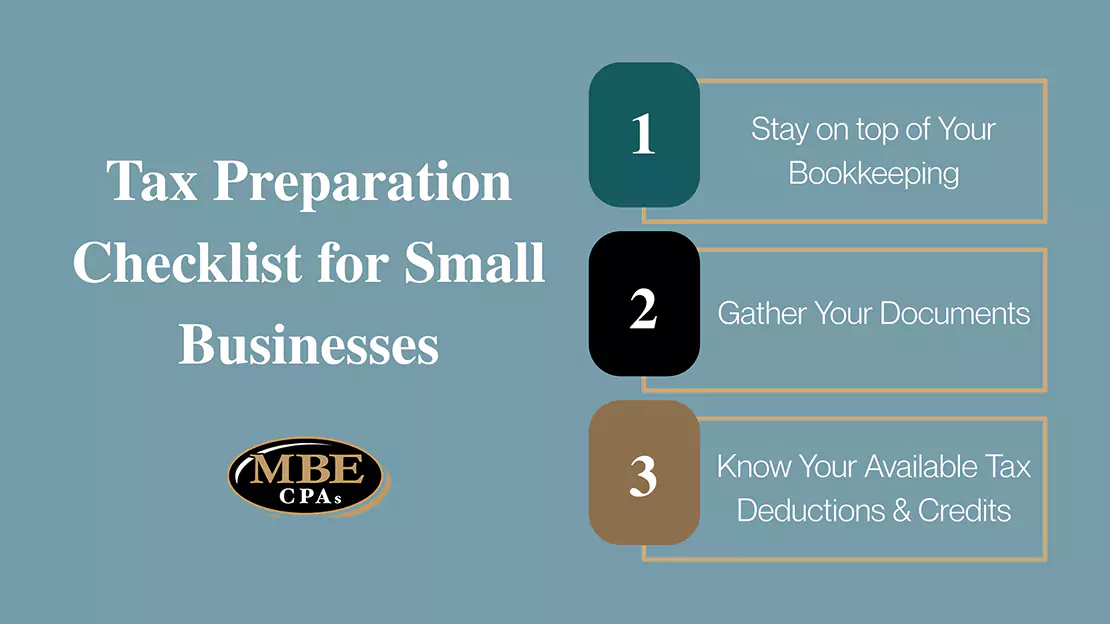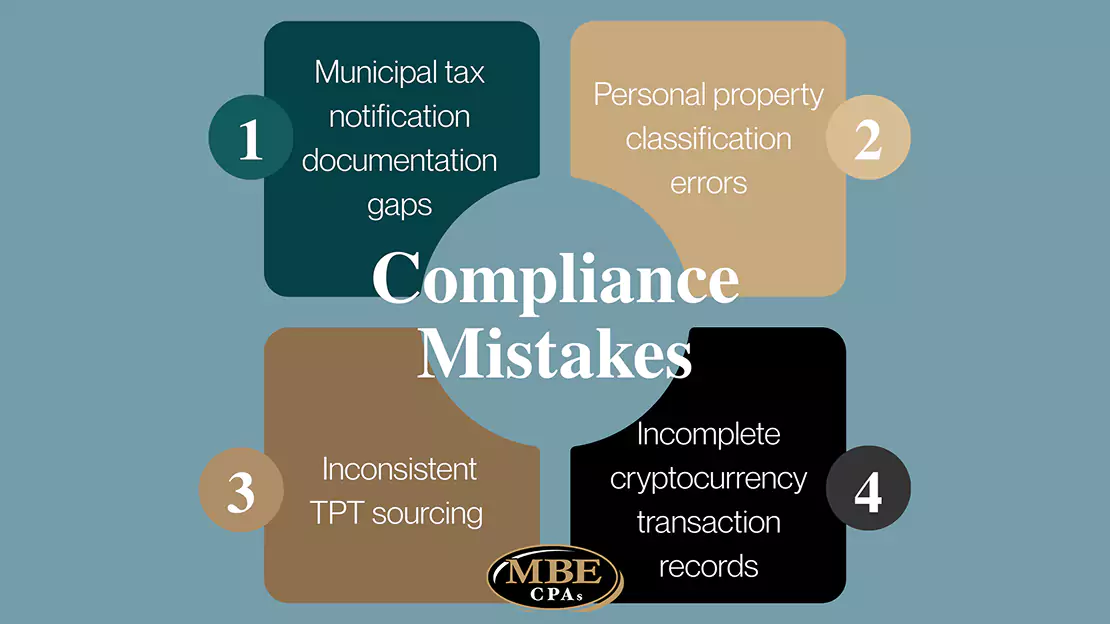How Arizona Small Business Owners can Save on Taxes in 2025

For small business owners in Arizona, 2025 is shaping up to be a year of opportunity. The 2025 Arizona Legislative Session focused on entrepreneurs, designing the newest proposals around strengthening the economy and supporting growth. The hope of this session was to attract businesses from all over the country, cementing Arizona’s status as a great place for communities to prosper and compete.
The session delivered changes that will reshape how business owners calculate taxes, manage compliance, and plan for growth. Are you prepared for the next tax season?
Featured Topics:
An Overview of the Small Business Victories
Several notable bills were signed into law on June 27, 2025, each of which affects Arizona businesses. Here are the bills making significant changes to the game:
- House Bill 2704. Renovations of Chase Field in downtown Phoenix are authorized without raising taxes. This bill, along with offering increased tourism in the city center, offers job protection and will promote consumer traffic at adjacent and nearby businesses. The downtown area of Phoenix is expected to thrive, making this bill the priority of the 2025 session.
- House Bill 2679. Businesses classified as large energy users will benefit from more predictable prices. Through securitization, utility services will issue lower-cost bonds and, therefore, promote cost savings and reduce interest costs.
- House Bill 2119. Cities are required to inform businesses before adopting a tax change, promoting greater transparency in the local tax code.
- Senate Bill 1543. International business expansion is now supported by allowing headquarters to construct on-site workforce housing and support services. Arizona strategically positions itself as a destination for long-term investment of global companies.
Each of these bills provides various accounting considerations and opportunities that small businesses can take advantage of after the bill becomes law.
For small businesses, here’s why these bills matter:
- Nearby construction will support local employment and increase foot traffic.
- The Arizona Corporation Commission has the authority to approve securitization and protect customers from sudden rate increases.
- Municipal tax transparency provides planning time to businesses for pricing and cash flow management.
- Local businesses can become vendors to international companies.
- With the growth of international projects and the increase of international workers, there will be an increase in demand for local services.
The end of the legislative session is on September 26, 2025, which is when these new laws will take effect. The outcome of this session is aimed at improving the infrastructure that will support the growing state population.

From Chamber Business News—Courtney Coolidge, executive vice president
How Will Arizona Small Business Operations Be Affected?
The previous section outlined the bills that will impact growth, costs, activity, and more. Additionally, businesses will feel the changes to how they strategize their taxes throughout the year, not just during tax season. These changes for small businesses include:
- Business Personal Property Tax Relief (Senate Bill 1069). Tax exemption on personal property was raised to $500,000. For small businesses with equipment, furniture, etc., potential tax burden relief could be recognized in annual savings.
- Transaction Privilege Tax Clarity (House Bill 2118). Transaction Privilege Tax (TPT) is now sourced based on seller’s business location, reducing tax calculation confusion and potential audits.
- Corporate Income Tax Disclosure Requirements (House Bill 2365). Publicly traded companies in Arizona must disclose their tax data annually. Future public discussions will be more informed on corporate contributions and tax equity.
There are proposed changes that are still in play, like a flat tax and tipped income tax relief. To stay prepared for this next tax season, small business owners should develop a checklist, as these tax-specific changes will require year-round strategies.

What Else Will Affect Business Owners’ Operations This Year?
The 2025 Legislative Session made several industry-specific changes, affecting businesses like short-term rentals and cryptocurrency.
- Short-Term Rental Operators. Vacation rentals have been re-classified in a distinct tax category separate from long-term residential properties.
- With these 2025 changes, short-term rental operators should develop year-end tax optimization strategies for rental property depreciation. For accurate income reporting, operators should also take on platform reconciliation services.
- Cryptocurrency Businesses. Cryptocurrency is recognized as a legal tender for debts and taxes, and kiosk operators now face licensing and fraud prevention measures. A new ban is proposed on the use of federally controlled digital currencies to promote decentralized financial systems (DeFi).
- For these businesses, it is important to report gains or losses similarly to stocks. Avoiding inconsistent valuation methods and missing transaction documentation will prevent owners from being repeat offenders.
Seeking guidance will help business owners reflect new costs in their pricing strategies following these changes. Fulfilling the new compliance changes will help the continuation of smooth operations.
By planning in advance with MBE CPAs, you can get a head start on preparing for these changes and implementing strategies that strengthen your business’s financial position throughout the year.
Next Steps for Small Business Owners
Now is the time for small business owners to understand the opportunities they qualify for. From personal property tax exemption to transaction privilege tax, planned business decisions can prevent costly corrections later.
- Conduct inventory of business assets
- Review calculations to ensure compliance based on seller location
- Establish a monitoring system for municipal tax changes
Additional tax law changes may take effect in the coming years. Modeling different scenarios to understand how your tax liability might be affected will be valuable for business growth.
How Can You Avoid Compliance Mistakes?
If your small business falls within one of the mentioned industry-specific categories, focus your attention on compliance during this period. Implement proper systems regarding new requirements before enforcement begins.
Here are the compliance mistakes to avoid:
- Inconsistent TPT sourcing
- Personal property classification errors
- Municipal tax notification documentation gaps
- Incomplete cryptocurrency transaction records
It is still important to look beyond the immediate compliance requirements and develop a strategy for Arizona’s broader economic changes.

Questions all Small Business Owners Should Ask
With these significant changes in place, it’s important for small business owners to assess their readiness. The following questions can help you evaluate your current position and plan for the future:
- Arizona is positioning itself as business-friendly through tax relief and energy cost stabilization—how do these trends affect your growth and expansion plans?
- For assessing compliance with the complex Arizona TPT tax, seeking help is a necessity—is your business complying with filing and payment requirements?
- With ongoing professional guidance, business owners can optimize their opportunities while still running operations—have you established a relationship with accounting professionals?
How Can MBE Help Navigate These Changes?
A long-term relationship with our clients is a continuously adapting process designed to help you as a business owner. It looks like this:
- Monthly/Quarterly updates on tax law changes
- Industry-specific compliance alerts
- Proactive planning recommendations
To tackle these proposed changes, our CPAs provide year-round tax planning that will help your business reap the benefits that Arizona legislators approved in 2025.
Businesses that proactively adapt have opportunities disguised as tax reform. Here is what MBE can help you optimize:
- Reduced tax burdens for exemption utilization
- Streamlined operations through simplified compliance
- Establish strategic tax planning initiatives with Arizona’s tax changes
Our specialized services at MBE CPAs will guide you toward maximizing tax exemptions and navigating your local requirements. Industry-focused service is what sets us apart.
Conclusion
Arizona’s changing legislative framework creates opportunities and challenges for small businesses. Rather than falling victim to compliance burdens, business owners can adopt competitive advantages through proper planning and guidance. Obtaining accurate projections can help you make informed decisions about future purchasing and staffing that will make or break your small business.
